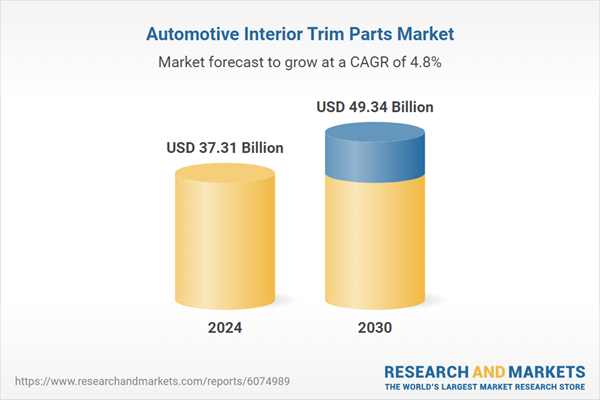Speak directly to the analyst to clarify any post sales queries you may have.
10% Free customizationThis report comes with 10% free customization, enabling you to add data that meets your specific business needs.
Key Market Drivers
Increasing Demand for Luxury and Comfort
The demand for luxury interiors is intensifying as consumers prioritize in-vehicle comfort and sophisticated aesthetics. Automakers are integrating upscale materials like soft-touch plastics, wood trims, and genuine leather to deliver refined cabin environments. Enhanced features such as ambient lighting, ventilated seats, and premium upholstery are now standard in many mid-to-high-end vehicles.The increase in disposable income, particularly in developing economies, is contributing to this trend, making upscale trims more accessible. Automakers are also differentiating products by offering immersive and ergonomic interiors tailored to specific consumer lifestyles. With luxury automotive brands influencing market expectations, mainstream carmakers are enhancing interior specifications across their lineups. The rise in leasing and financing options further enables broader access to premium trim levels.
Key Market Challenges
High Production Costs of Premium Materials
Premium materials such as real wood, carbon fiber, and authentic leather significantly elevate production expenses due to their cost and the precision manufacturing required. High-end trims necessitate advanced processing technologies and expert craftsmanship, making it difficult for manufacturers to offer them affordably across all vehicle segments. In cost-sensitive markets, consumers often prioritize value, limiting the widespread adoption of luxury interiors. Additionally, external factors like fluctuating raw material prices, import duties, and foreign exchange variations further strain production budgets. Automakers are compelled to balance cost efficiency with quality, often exploring synthetic alternatives to replicate premium finishes at reduced costs.Key Market Trends
Expansion of Vegan and Eco-Friendly Materials
The growing emphasis on environmental sustainability is fueling the shift toward vegan and eco-conscious interior materials. Automakers are increasingly adopting recycled plastics, biodegradable composites, and plant-based leathers derived from sources such as pineapple and mushroom fibers. This trend aligns with evolving consumer preferences for ethically produced and environmentally friendly products. Transparency in sourcing and manufacturing processes is gaining importance, with brands collaborating with sustainable fashion companies to promote eco-friendly innovations. Furthermore, the use of water-based coatings, low-VOC adhesives, and non-toxic dyes is becoming more prevalent, enhancing both product safety and regulatory compliance.Key Market Players
- Adient
- Benecke-Kaliko AG
- Borgers SE & Co. KGaA
- Draexlmaier Group
- Litespeed Racing LLC
- Faurecia
- Grupo Antolin
- Grupo Kuo
- GST AutoLeather, Inc.
- Magna International
Report Scope:
In this report, the Global Automotive Interior Trim Parts Market has been segmented into the following categories, in addition to the industry trends which have also been detailed below.Global Automotive Interior Trim Parts Market, By Vehicle Type:
- Passenger Cars
- Commercial Vehicles
Global Automotive Interior Trim Parts Market, By Distribution Channel:
- OEM
- Aftermarket
Global Automotive Interior Trim Parts Market, By Material:
- Plastics
- Composites
- Metals
- A-Line
- Leather/Fabric
- Others
Global Automotive Interior Trim Parts Market, By Region:
- North America
- United States
- Canada
- Mexico
- Europe & CIS
- Germany
- France
- U.K.
- Spain
- Italy
- Asia-Pacific
- China
- Japan
- Australia
- India
- South Korea
- Middle East & Africa
- South Africa
- Saudi Arabia
- UAE
- Turkey
- South America
- Brazil
- Argentina
Competitive Landscape
Company Profiles: Detailed analysis of the major companies present in the Global Automotive Interior Trim Parts Market.Available Customizations:
With the given market data, the publisher offers customizations according to the company’s specific needs. The following customization options are available for the report.Company Information
- Detailed analysis and profiling of additional market players (up to five).
This product will be delivered within 1-3 business days.
Table of Contents
Companies Mentioned
- Adient
- Benecke-Kaliko AG
- Borgers SE & Co. KGaA
- Draexlmaier Group
- Litespeed Racing LLC
- Faurecia
- Grupo Antolin
- Grupo Kuo
- GST AutoLeather, Inc.
- Magna International
Table Information
| Report Attribute | Details |
|---|---|
| No. of Pages | 185 |
| Published | April 2025 |
| Forecast Period | 2024 - 2030 |
| Estimated Market Value ( USD | $ 37.31 Billion |
| Forecasted Market Value ( USD | $ 49.34 Billion |
| Compound Annual Growth Rate | 4.7% |
| Regions Covered | Global |
| No. of Companies Mentioned | 10 |









